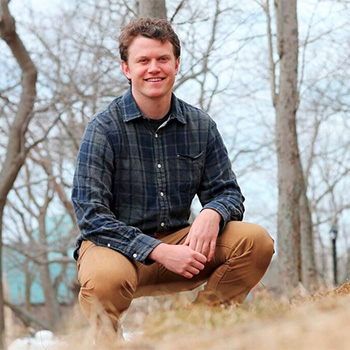To simplify his research and communicate it in an engaging way, Adam Cheeseman picked up a Sharpie marker and started drawing.
Using hand-drawn illustrations to explain his graduate thesis seemed natural for the second-year Environmental Studies master’s student — especially since some of his primary research has included soliciting drawings from children attending summer camps.
Cheeseman was sketching his research, frame by frame, to create a stop-motion video for the Social Sciences and Humanities Research Council (SSHRC) Storytellers competition. The annual contest challenges SSHRC-funded students like Cheeseman to showcase the impact of their research in clever and creative ways. The real test: doing so in three minutes or 300 words.
"It was kind of bad because my research has an environmental focus, and I had a big thick stack of paper at the end of it with all my mistakes," says the 23-year-old grad student, laughing about his drawing skills. His research focuses on assessing the impact of summer camps on children’s feelings of environmental responsibility.
His efforts have paid off: SSHRC announced Monday he is one of 25 finalists selected out of 200 entries submitted to this year’s competition and the only Nova Scotia university student to make the cut.
Hand-drawn creations
To distinguish his video, Cheeseman incorporated drawings from some of the kids he's interviewed in his research — an editing move that has a powerful impact.
“Everybody has seen kids draw, so I was hoping that would make it relatable,” he says.
Cheeseman, who grew up in a small town on the shores of Georgian Bay in Ontario, says his own experience working at different summer camps over the years opened his eyes to their suitability as a space to research how exposure to nature helps children learn about environmental topics while developing a strong connection with the natural world.
One of the clips in his video shows a child’s drawing of a bicep with the words I feel powerful because I know I make a difference underneath. “With the bicep, she was saying that when she’s outside at camp she feels powerful and that she can make a difference in the world,” says Cheeseman.
As a finalist, Cheeseman receives $3,000 and free enrolment in a research communications master class at the upcoming 2016 Congress of the Humanities and Social Sciences at the University of Calgary happening in late May.
He and the other finalists will also deliver presentations to a live audience during Congress — the largest social sciences and humanities conference of its kind in Canada. The top five chosen by a panel of judges win an all-expenses-paid trip to the 2016 SSHRC Impact Awards, where they will again have the opportunity to present their research.
Connecting kids with sustainability
Cheeseman says he first became interested in researching the impact of summer camps as an undergraduate at Mount Allison University. While there, he did an honours project that focussed on what camps in Nova Scotia, New Brunswick, and Ontario have done at the administrative level to integrate environmental education into their programming.
 At Dal, he decided to expand his research to include direct input from the campers themselves, something he says is lacking in current literature on the topic.
At Dal, he decided to expand his research to include direct input from the campers themselves, something he says is lacking in current literature on the topic.
After defending his thesis later this spring, Cheeseman says he plans to take a bit of time off from school to work before eventually pursuing a PhD in a related topic. Eventually, he says he’d to be able to work with camping associations or different summer camps to help recommend best practices or enhance programming.
“I want to emphasize how important education can be to promoting change,” he says, "and as a way to enhance attitudes and behaviours to promote different things like the environment.”
Comments
comments powered by Disqus

